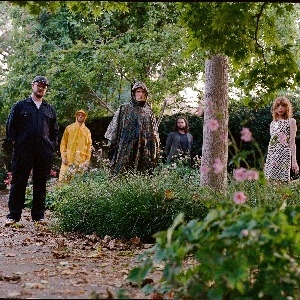DITZ
Brudenell Social Club, Leeds.

14+ only. 14s to 17s must be accompanied by an adult. No refunds will be given for incorrectly booked tickets.
More information about DITZ tickets
‘Never Exhale’ is the sound of a band that hasn’t stopped for a breath. DITZ have toured relentlessly since the release of their first album ‘The Great Regression’ and even before that, travelling at least 100 days a year since COVID. The songs that form their newest offering were written across Europe, often on off days and in borrowed rehearsal rooms just to break up the long drives. It could be said that the band treat recording and release of music as an afterthought. Often playing songs live years before their release, tweaking them as they go. The songs on the final record may change before they are ever heard as part of the album. ‘Never Exhale’ was largely recorded at Holy Mountain studios in London during a freezing cold January. The process was fraught with obstacles. The original plan, to go and record in Rhode Island, was abandoned when DITZ were offered a support tour with IDLES, although the album was still mixed by the originally intended engineer, Seth Manchester (Model/Actriz, Lingua Ignota, Big Brave). The result is an album hardened by the pressure of its own making. Laboured but not loved. The album themes reveal themselves more on further listens. The opening gambit ‘Taxi Man’ is an exploration into what it would be like to weigh up your impact of the world. The eponymous taxi man could be seen as a St Peter type figure, or like Charon, ferrying the dead into the underworld. Further on the album explores themes of unnecessary hatred and division, ‘Space/Smile’ and ‘It smells like something died in here’, aging, ‘Senor Siniestro’ and the separation of the physical from reality, ‘The Body As A Structure’. It’s political, but ultimately personal. More Genet or Kafka than Orwell or Huxley. Sonically the album has its roots in the usual DITZ influences, classic noise rock such as The Jesus Lizard or Shellac, or the obtuse post punk of the Fall, but also brings in fresh influences. The closing track ‘Britney’ could be compared to Radiohead or Mogwai. Overall, the album is a clear development from their first effort. A sign of things to come.


